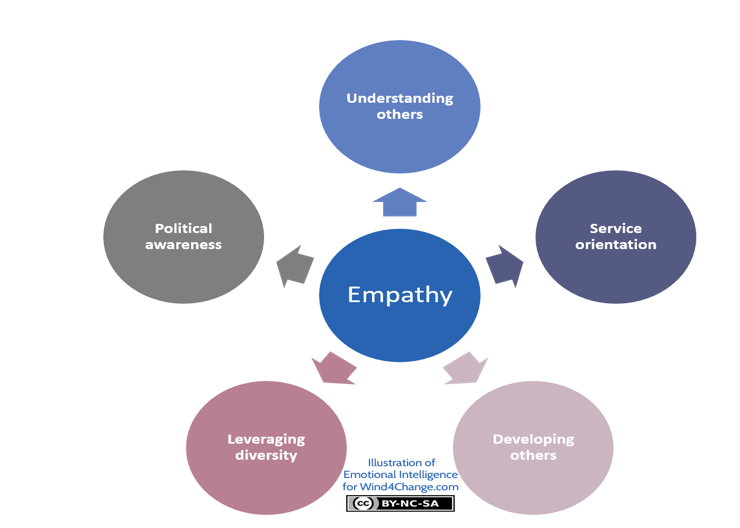Emotional Intelligence: The Secret to SCM Success

EI refers to the ability to recognize, understand, and manage our own emotions as well as those of others. Whereas, SCM involves the coordination of activities related to the flow of goods, services, information, and finances across the entire supply chain.
EI plays a crucial role in workplace performance, leadership, and personal excellence.
Power of Communication
Leaders with high emotional intelligence can better understand and deal with the diverse and often uncertain human aspects of supply chain management. They can build strong relationships with team members, partners, and stakeholders, fostering collaboration and adaptability in the face of uncertainties.

EI-Driven Leadership in SCM
Stronger Connections: Leaders with high EI build better relationships with suppliers, customers, and team members.
Enhanced Teamwork: EI fosters collaboration, communication, and conflict resolution within supply chain teams.
Decision-Making: Emotionally intelligent leaders make informed decisions considering rational and emotional aspects.
Adaptability: SCM requires flexibility; EI helps leaders adapt to changing circumstances.
How Emotionally Intelligent Leaders can drive success in SCM
Self-Management: Leaders regulate their emotions during high-pressure situations.
Empathy: Understanding the needs and concerns of supply chain partners.
Influence: Persuading stakeholders effectively.
Motivation: Maintaining enthusiasm and resilience.
Frequently Asked Questions Answered by Chandan Mangalore Laxman
1. What emotional intelligence techniques can be employed to ensure smooth transitions and minimize resistance during supply chain changes?
Active Listening
By demonstrating patience and truly hearing their perspectives, you can address their emotional needs effectively.
Empathy and Compassion
Show empathy toward those affected by the changes. Compassionately communicate the reasons behind the changes and how they align with the organization’s goals.
Stress Management
When leaders model effective stress management, it positively impacts the entire team.
Clear Communication
When people understand the “why” behind the changes, they are more likely to embrace them.
Collaboration
Collaboration also builds trust and reduces resistance.
Conflict Resolution
Handling conflicts with emotional intelligence ensures smoother transitions.
2. How can emotional intelligence contribute to the adaptability and resilience of a supply chain with a diversified supplier base during disruptions or market changes?
Self-Awareness: Supply chain professionals with high EQ are self-aware. By understanding their emotional responses, they can make informed decisions during disruptions. For example, if a key supplier faces challenges, a self-aware leader won’t panic but will assess the situation objectively.
Adaptability: EQ enables individuals to adapt to changing circumstances. When market dynamics shift or a supplier faces issues (e.g., production delays, quality problems), emotionally intelligent leaders remain flexible. They seek alternative solutions, explore new suppliers, and adjust their strategies. Their adaptability ensures continuity in the supply chain.
Relationship Management: Building strong relationships with suppliers is crucial. EQ helps supply chain professionals communicate effectively, resolve conflicts, and collaborate. During disruptions, maintaining positive relationships with suppliers allows for open dialogue. It fosters trust, making it easier to negotiate solutions or find alternative sources.
Stress Tolerance: Supply chain disruptions can be stressful. High EQ individuals manage stress effectively. They don’t panic or react impulsively. Instead, they stay composed, assess risks, and develop contingency plans. Their ability to handle pressure positively impacts decision-making and problem-solving.
Resilience: Resilience is about bouncing back from setbacks. Emotionally intelligent leaders view disruptions as opportunities for growth. They learn from challenges, adapt their strategies, and build stronger supply chains. Resilience ensures that disruptions don’t derail the entire system.
3. What EI-driven approaches can be used to balance the need for diversification with the commitment to ethical sourcing and environmental responsibility?
Self-Awareness and Ethical Alignment
Is crucial for supply chain leaders. Understand your values, ethical priorities, and commitment to sustainability. Reflect on how diversification aligns with these principles. Evaluate potential suppliers based on their ethical practices. Consider factors such as fair labour practices, environmental impact, and community engagement.
Emotional Regulation and Decision-Making
Use emotional intelligence to objectively assess the impact of diversification on ethical and environmental goals. Balance short-term gains with long-term sustainability.
Empathy and Stakeholder Engagement
Enables understanding of stakeholders’ perspectives. Engage with suppliers, employees, and local communities. When diversifying, consider how it affects various stakeholders. Empathize with their concerns and needs. Transparent communication builds trust.
Motivation and Sustainability Goals
Drives action. Set clear sustainability goals for your supply chain. Align diversification efforts with these goals. Motivated leaders actively seek suppliers who share their commitment to ethical practices and environmental stewardship.
Social Skills and Collaboration
Facilitate collaboration. Work closely with suppliers, NGOs, and industry peers. Collaborate on sustainable practices. Share best practices, conduct joint audits, and promote responsible sourcing. Collective efforts enhance impact.
Adaptability and Innovation
Is essential in a dynamic supply chain. Embrace change. Innovate by exploring diverse sourcing options. Look beyond traditional suppliers. Consider local artisans, social enterprises, and eco-friendly alternatives.
Environmental Intelligence
Understand the environmental impact of diversification. Consider factors like transportation emissions, resource usage, and waste generation. Make informed choices that minimize harm. Prioritize suppliers with eco-friendly practices.
4. What EI-driven methods can help supply chain managers to quickly build rapport and trust with alternative suppliers in times of crisis?
Asking the Right Questions to Find Solutions
Listen actively to suppliers’ concerns and challenges. Ask open-ended questions to understand their needs and constraints. By showing genuine interest, you build rapport and demonstrate empathy.
Listening with Empathy to Elevate the Partnership
Empathetic listening is crucial. Understand suppliers’ emotions, fears, and uncertainties. Acknowledge their feelings and validate their experiences. When they feel heard, trust grows.
Understanding Factors That Influence Your Interactions
Consider cultural differences, communication styles, and individual preferences. Adapt your approach based on these factors. Recognize that trust is built through understanding and respect.
Talking About Money Transparently
Be open about financial matters. Discuss payment terms, pricing, and financial stability. Transparency fosters trust. If there are challenges, address them honestly and collaboratively
Making It Right for Clients After an error on Your End
When you make an error, take ownership and rectify it promptly. Apologize sincerely and offer solutions. Trust is often strengthened when suppliers see your commitment to making amends.
Having Positive ‘Mindful Brainstorms
Engage in collaborative problem-solving. Encourage brainstorming sessions where both parties contribute ideas. A positive, solution-oriented mindset builds trust and strengthens the partnership
Maintaining Long-Term Relationships and Ongoing Growth
View suppliers as long-term partners. Regularly check in, provide updates, and discuss mutual goals. Show appreciation for their contributions. Consistent communication reinforces trust.
Taking Ownership of Mistakes
When things go wrong, don’t blame others. Accept responsibility and focus on solutions. Trust is eroded when leaders deflect blame. Demonstrate accountability and a commitment to improvement.
Remember that EI-driven actions are not just about business transactions; they’re about building authentic connections. By prioritizing emotional intelligence, supply chain managers can navigate crises while maintaining strong relationships with alternative suppliers
Comments
No comments yet. Be the first to comment!
